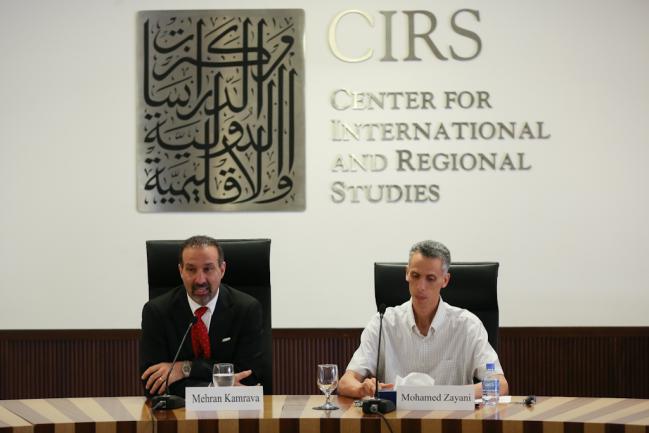Dialogue Series, Race & Society, Regional Studies
Networked Arab Publics and Contention in the Digital Age

Mohamed Zayani, Associate Professor at the Georgetown University School of Foreign Service in Qatar, delivered a CIRS Focused Discussion lecture on “Networked Arab Publics and Contention in the Digital Age” on April 15, 2014. The talk was based on Zayani’s ongoing book project, which analyzes the changing relationship between media and politics in the Arab world, especially as it relates to the Arab uprisings in Tunisia. The book provides an ethnographic account of evolving media practices that bring into focus the intricate relationship between the emerging digital culture in the Arab world; youth engagement and youth involvement; cyber dissidence and resistance; and political expression. Zayani was prompted into further investigations on the subject because in much of the literature, the role of media, especially social media, was either highly inflated or unduly analyzed, leaving little room to cogitate upon the complexities of the nuanced relationship between people, media, politics, and power.
Examining the media’s role in the Arab uprisings, Zayani highlighted the importance of country-specific studies. There has been a tendency to cast the countries of the Arab uprisings into a single homogenous phenomenon under the rubric of the “Arab Spring,” without paying attention to the important contextual differences between each state. Tunisia proved to be a crucial site of convergence for media, politics, and popular contention as it was the first Arab country to connect to the Internet in 1991 and the first overt site of the Arab uprisings. Thus, Zayani analyzes the correlation between Internet penetration and political change, arguing that “on the one hand, the country lived under the rule of a regime that proved adept at modernizing authoritarianism and ensuring regime durability. On the other hand, the country adopted an avant-garde Internet development model and purposefully sought to build a digital infrastructure that is capable of positioning the country as a model for an aspiring networked society in the age of globalization.” Attempts to balance these two factors was a challenge for the Tunisian regime, which ultimately collapsed under the pressure of a technologically-equipped and vocalized public.
As Arab media quickly developed during the 1990s creating a virtual public sphere where political issues could be discussed relatively openly, this schism became even more pronounced. Internet activism was especially propelled by a number of factors including the demographic reality of the region, which was encompassed in a youth bulge where two-thirds of the Arab world are below the age of 25. “The conundrum was that this significant socio-demographic category has been largely left out of political life – or at least that was the perception.” Importantly, this significant and growing youthful population was buoyed by two simultaneous phenomena of mass education and mass media, both of which were significant in their challenge to traditional constructions of authority and advocacy of critical thinking.
Focusing on questions of political socialization, Zayani’s study is geared towards answering a central question: “how do young people become politicized on the Internet?” This goes against the general assumption that Arab youth were, on the whole, politically marginalized and disinterested. The events of the Arab uprisings proved the contrary, and Arab youth exhibited strong political consciousness, activism, and engagement. The main overlooked issue is that they tend to express their political stances through means other than formal political structures.
Thus, Zayani concluded by noting the importance of challenging traditional categorizations of what it means to be political, explaining: “My study aims to redirect attention from the formal political institutions of the Arab world to the politics of everyday life.” In this reformulation, digital contention yields more than just dissidence; it encourages other forms of assertiveness associated with the concept of citizenship.
Mohamed Zayani is an Affiliate Faculty with the Communication, Culture and Technology Graduate Program and the 2013-1014 Faculty Fellow with the Center for Regional and International Studies. His works include Reading the Symptom (1999), Arab Satellite Television and Politics in the Middle East (2004), The Al Jazeera Phenomenon: Critical Perspectives on New Arab Media (2005) and The Culture of Al Jazeera: Inside an Arab Media Giant (2007). He is a recipient of numerous grants, including a Social Science Research Council grant, and a Member of the UNESCO Committee of Experts on Cultural Diversity.
Article by Suzi Mirgani, Manager and Editor for CIRS Publications